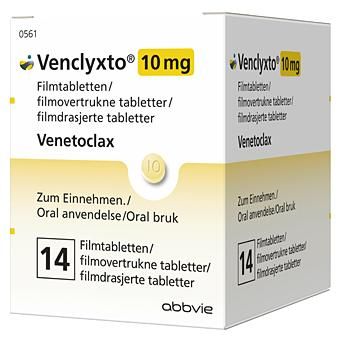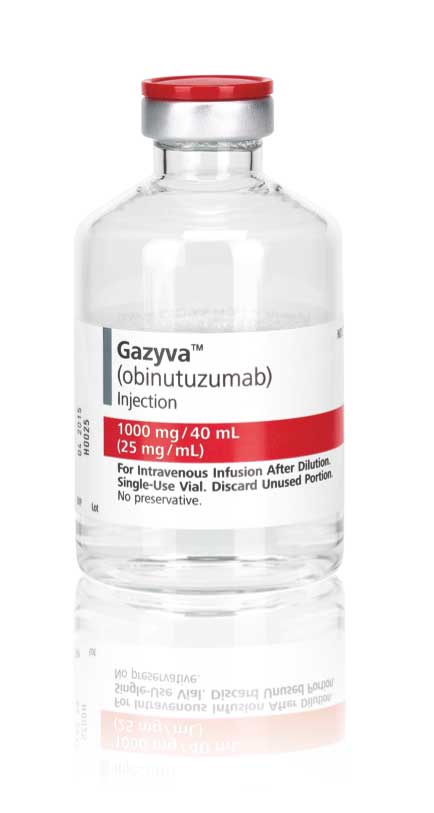For The Latest Medical News, Health News, Research News, COVID-19 News, Pharma News, Glaucoma News, Diabetes News, Herb News, Phytochemical News, Thailand Cannabis News, Cancer News, Doctor News, Thailand Hospital News, Oral Cancer News, Thailand Doctors
• The phase III CLL14 study compared Venclexta/Venclyxto in combination with Gazyva/Gazyvaro to standard-of-care Gazyva/Gazyvaro plus chlorambucil
• Data will be submitted to health authorities and presented at an upcoming medical meeting
1 November 2018 - Roche (SIX: RO, ROG; OTCQX: RHHBY) announced today that the randomised phase III CLL14 study, which evaluated fixed-duration Venclexta®/Venclyxto® (venetoclax) in combination with Gazyva®/Gazyvaro® (obinutuzumab) in people with previously untreated chronic lymphocytic leukaemia (CLL) and co-existing medical conditions, met its primary endpoint and showed a statistically significant reduction in the risk of disease worsening or death (PFS; as assessed by investigator) compared to standard-of-care Gazyva/Gazyvaro plus chlorambucil. The results showed that no new safety signals or increase in known toxicities of Venclexta/Venclyxto or Gazyva/Gazyvaro were observed with the treatment combination.
“People with chronic lymphocytic leukaemia continue to need more treatment options because some patients are unable to tolerate chemotherapy regimens due to their underlying health,” said Sandra Horning, MD, Roche’s Chief Medical Officer and Head of Global Product Development. “CLL14 is the first study to show superior progression-free survival for Venclexta/Venclyxto plus Gazyva/Gazyvaro compared to a standardof-care regimen. We will work with health authorities to bring this potential chemotherapy-free treatment option to people who need it as quickly as possible.”
Data from the CLL14 study will be submitted to global health authorities. Venclexta in combination with Rituxan® (rituximab) has been approved by the US Food and Drug Administration (FDA) for the treatment of people with CLL or small lymphocytic lymphoma, with or without 17p deletion, who have received at least one prior therapy. Venclyxto in combination with MabThera® (rituximab) has recently been approved in Europe for people with previously treated CLL, who have received at least one prior therapy, based on results from the randomised phase III MURANO study.
A robust clinical development programme for Venclexta/Venclyxto is ongoing in several types of blood cancer, including acute myeloid leukaemia and multiple myeloma. Gazyva/Gazyvaro continues to be investigated in combination with approved and investigational Roche and non-Roche molecules in CLL and follicular lymphoma.
Venclexta/Venclyxto (venetoclax) is being developed by AbbVie and Roche. It is jointly commercialised by AbbVie and Genentech, a member of the Roche Group, in the United States and commercialised by AbbVie outside of the United States.
CLL14 (NCT02242942) is a randomised phase III study evaluating the combination of fixed-duration Venclexta/Venclyxto plus Gazyva/Gazyvaro compared to Gazyva/Gazyvaro plus chlorambucil in patients with previously untreated chronic lymphocytic leukaemia (CLL) with coexisting medical conditions. 432 patients with previously untreated CLL were randomly assigned to receive either Venclexta/Venclyxto plus Gazyva/Gazyvaro (Arm A) or Gazyva/Gazyvaro plus chlorambucil (Arm B). The primary endpoint of the study is investigator-assessed progression free survival (PFS). Secondary endpoints include PFS assessed by independent review committee, best overall response, complete response, duration of response, overall survival, event-free survival, time to next CLL treatment, minimal residual disease status and safety. The CLL14 study is being conducted in cooperation with the German CLL Study Group (GCLLSG), headed by Michael Hallek, MD, University of Cologne.

Venclexta/Venclyxto is a first-in-class targeted medicine designed to selectively bind and inhibit the B-cell lymphoma-2 (BCL-2) protein. In some blood cancers and other tumours, BCL-2 builds up and prevents cancer cells from dying or self-destructing, a process called apoptosis. Venclexta/Venclyxto blocks the BCL – 2 protein and works to restore the process of apoptosis.
Venclexta/Venclyxto is being developed by AbbVie and Roche. It is jointly commercialised by AbbVie and Genentech, a member of the Roche Group, in the United States and by AbbVie outside of the United States. Together, the companies are committed to research with Venclexta/Venclyxto, which is currently being studied in clinical trials across several types of blood and other cancers.
In the United States, Venclexta has been granted four Breakthrough Therapy Designations by the FDA: in combination with Rituxan for people with relapsed or refractory chronic lymphocytic leukaemia (CLL); as a monotherapy for people with relapsed or refractory CLL with 17p deletion; in combination with hypomethylating agents (azacitidine or decitabine) for people with untreated acute myeloid leukaemia (AML) ineligible for intensive chemotherapy; and in combination with low-dose cytarabine for people with untreated AML ineligible for intensive chemotherapy. A supplemental New Drug Application has been submitted to the FDA for Venclexta, in combination with a hypomethylating agent or in combination with low dose cytarabine, for the treatment of people with previously untreated AML who are ineligible for intensive chemotherapy.
Venclexta/Venclyxto is approved in more than 50 countries. Roche and AbbVie are currently working with regulatory agencies around the world to bring this medicine to additional eligible patients in need.

Gazyva/Gazyvaro is an engineered monoclonal antibody designed to bind to CD20, a protein expressed on certain B-cells (a type of white blood cell), but not on stem cells or plasma cells. Gazyva/Gazyvaro is designed to attack and destroy targeted B-cells both directly and together with the body's immune system. Gazyva is marketed as Gazyvaro in the EU and Switzerland.
Gazyva/Gazyvaro is currently approved in more than 90 countries in combination with chlorambucil for people with previously untreated chronic lymphocytic leukaemia, in more than 80 countries in combination with bendamustine for people with certain types of previously treated follicular lymphoma and in more than 70 countries in combination with chemotherapy for previously untreated follicular lymphoma. Additional combination studies investigating Gazyva/Gazyvaro with other approved or investigational medicines, including cancer immunotherapies and small molecule inhibitors, are underway across a range of blood cancers.
(GCLLSG) Founded in 1996 and headed by Dr. Michael Hallek, the GCLLSG has been running various phase III, phase II and phase I trials in chronic lymphocytic leukaemia (CLL) with the goal to provide optimal treatment to patients suffering from this disease. Among those were landmark trials like the CLL8 and the CLL11 trials which led to the current standard-of-care in CLL. For many years, GCLLSG has been aiming to improve not just the treatment of younger and physically fit patients, but also that of elderly and less fit patients. These patients are generally underrepresented in clinical trials although they constitute the majority of CLL patients treated by doctors in daily practice. The GCLLSG is an independent non-profit research organisation supported by the German Cancer Aid (Deutsche Krebshilfe). www.dcllsg.de
For more than 20 years, Roche has been developing medicines that redefine treatment in haematology. Today, we are investing more than ever in our effort to bring innovative treatment options to people with diseases of the blood. In addition to approved medicines MabThera®/Rituxan® (rituximab), Gazyva®/Gazyvaro® (obinutuzumab), and Venclexta®/Venclyxto® (venetoclax) in collaboration with AbbVie, Roche’s pipeline of investigational haematology medicines includes Tecentriq® (atezolizumab), an antiCD79b antibody drug conjugate (polatuzumab vedotin/RG7596) and a small molecule which inhibits the interaction of MDM2 with p53 (idasanutlin/RG7388). Roche’s dedication to developing novel molecules in haematology expands beyond malignancy, with the development of Hemlibra® (emicizumab), a bispecific monoclonal antibody for the treatment of haemophilia A.
Roche is a global pioneer in pharmaceuticals and diagnostics focused on advancing science to improve people’s lives. The combined strengths of pharmaceuticals and diagnostics under one roof have made Roche the leader in personalised healthcare – a strategy that aims to fit the right treatment to each patient in the best way possible.
Roche is the world’s largest biotech company, with truly differentiated medicines in oncology, immunology, infectious diseases, ophthalmology and diseases of the central nervous system. Roche is also the world leader in in vitro diagnostics and tissue-based cancer diagnostics, and a frontrunner in diabetes management. Founded in 1896, Roche continues to search for better ways to prevent, diagnose and treat diseases and make a sustainable contribution to society. The company also aims to improve patient access to medical innovations by working with all relevant stakeholders. Thirty medicines developed by Roche are included in the World Health Organization Model Lists of Essential Medicines, among them life-saving antibiotics, 4/4 antimalarials and cancer medicines. Moreover, for the tenth consecutive year, Roche has been recognised as the most sustainable company in the Pharmaceuticals Industry by the Dow Jones Sustainability Indices (DJSI).
The Roche Group, headquartered in Basel, Switzerland, is active in over 100 countries and in 2017 employed about 94,000 people worldwide. In 2017, Roche invested CHF 10.4 billion in R&D and posted sales of CHF 53.3 billion. Genentech, in the United States, is a wholly owned member of the Roche Group. Roche is the majority shareholder in Chugai Pharmaceutical, Japan. For more information, please visit www.roche.com.
All trademarks used or mentioned in this release are protected by law.
Roche Group Media Relations Phone: +41 61 688 8888 / e-mail: media.relations@roche.com - Nicolas Dunant (Head) - Patrick Barth - Ulrike Engels-Lange - Simone Oesc • The phase III CLL14 study compared Venclexta/Venclyxto in combination with Gazyva/Gazyvaro to standard-of-care Gazyva/Gazyvaro plus chlorambucil • Data will be submitted to health authorities and presented at an upcoming medical meeting